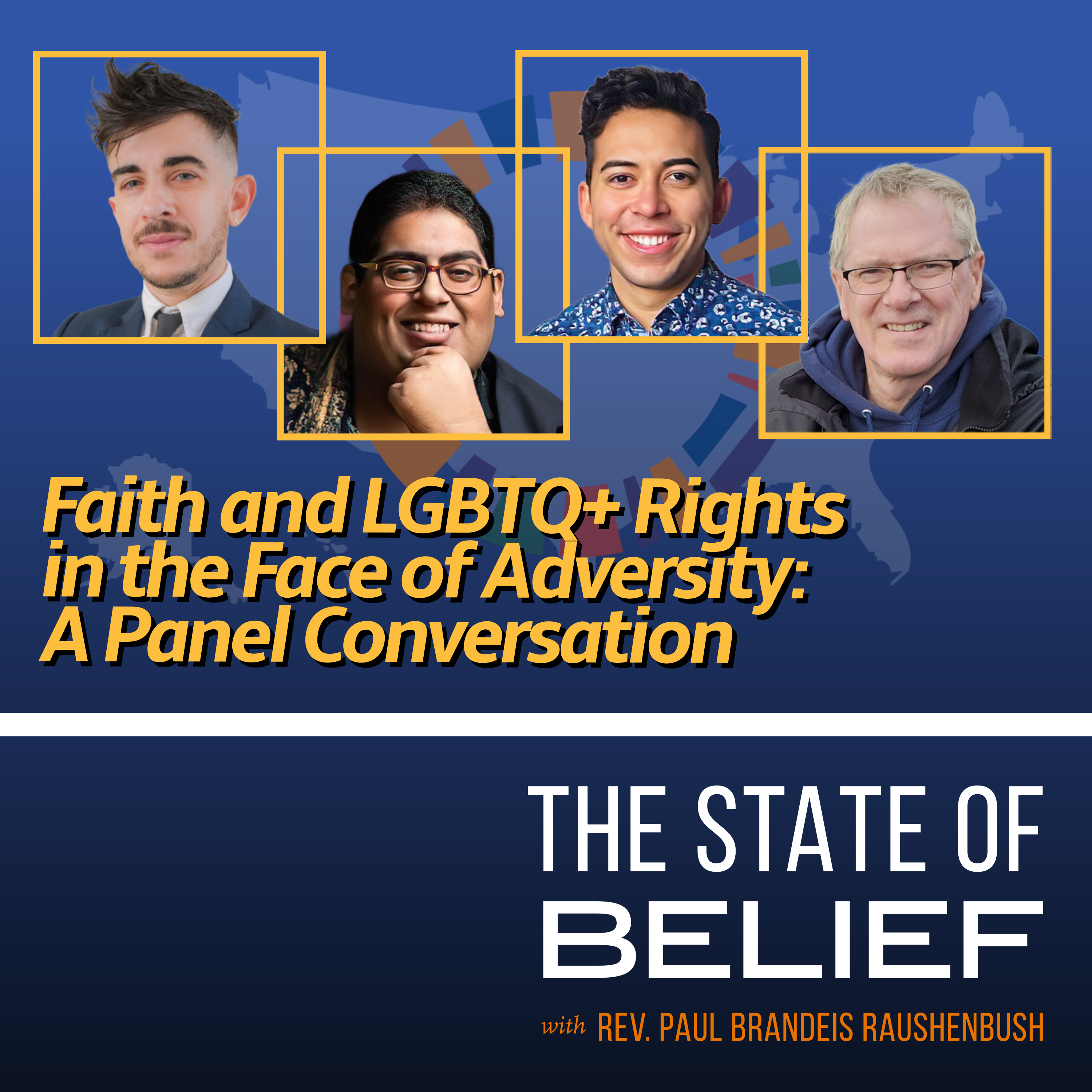
This week, you’ll hear a powerful panel discussion hosted by Rev. Paul Raushenbush and featuring four leading LGBTQ+ and faith activists: Chase Strangio (ACLU), Tahil Sharma (LGBTQ Task Force), Jon Cohen (Keshet), and Ross Keys (Interfaith Alliance of North Dakota). They discuss the intersection of faith and LGBTQ+ rights, the critical threats facing the trans community, and the importance of self-care in activism. Together, they advocate for collective action and highlight the role that faith communities can and must play in supporting LGBTQ+ rights, pushing back against harmful rhetoric, and ensuring a future of inclusion and protection for all.
Chase Strangio discusses the broader societal implications of controlling people’s bodies and families: “Control over the body and control over the family is a central tool of authoritarian regimes in order to control society at large. There is a need to control people’s imagination, people’s sense of what they can do with their bodies, what they can do with their desire, and what they can do with their families.” Tahil Sharma underscores the importance of clear communication and solidarity between different communities, stressing, “Religious folks, faith leaders, folks within faith institutions and communities need to do a better job at translating between communities so we can really understand how we can build solidarity…We need to be so clear that if we need to build solidarity, we need to make sure people understand that we’re standing with them.”
Jon Cohen, highlighting a simple fact that often goes overlooked, says, “A majority of people of faith support LGBTQ non-discrimination, and that’s really showing up in the work… And it feels like a privilege to be able to do this work and to be able to channel our energy to do something about it, and to really put our resources to making things better for the LGBTQ community.” Ross Keys emphasizes the need to be carefully strategic and self-aware in activism, saying, “Understand your limits. Focus. If you think you can work on all the bills, you’re going to watch them all pass by and not get a thing done – and you’re probably going to get burned out at the same time.”
Chase Strangio is co-director of the ACLU’s LGBT & HIV Project and a nationally-recognized expert on transgender rights. Chase’s work includes impact litigation, as well as legislative and administrative advocacy, on behalf of LGBTQ people and people living with HIV across the United States. He’s the first transgender attorney to argue a case in front of the US Supreme Court.
Tahil Sharma is the faith director at the National LGBTQ Task Force and has been dedicated to the work of interfaith cooperation and social justice for over ten years. Born to a Sikh mother and a Hindu father, Tahil’s inter-religious upbringing in Los Angeles influenced his willingness to connect with people across differences and inspired him to engage in the work of storytelling and bridge-building.
Jon Cohen is a national community builder with a commitment to LGBTQ+ rights. His work organizing diverse communities through an intersectional Jewish lens is inspired by the wisdom and experiences he has gained as a Gay Mexican Jew. As Keshet’s Director of Community Mobilization, Jon has led initiatives helping Jewish institutions in all 50 states to fight for LGBTQ+ rights.
Ross Keys heads the Interfaith Alliance of North Dakota. He’s also a longtime leader of the North Dakota Human Rights Council, and has worked in the federal government for nearly thirty years, holding a number of positions for Congressman Earl Pomeroy and Senators Heidi Heitkamp and Kent Conrad. Ross has crisscrossed the state with each of these elected officials and had the opportunity to help North Dakotans on a number of issues.
As a nonprofit, though, we also depend on the generosity of readers to support our work. Today, far fewer than 1 percent of the 500,000+ people who visit this site in an average month are also donors. But if just a few of the you who read all the way to the bottom of this note decide to join us as supporters, we'd be sure to have the resources to continue, and expand, our journalism.
So if you value this kind of reporting, we ask you to consider making a gift today. Be part of the one percent and help ensure our reporting is always there for those who depend on it.
